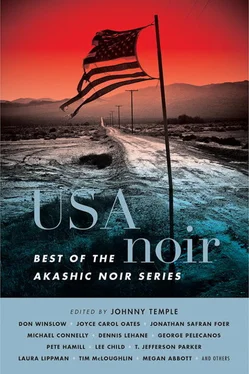Johnny Temple - USA Noir - Best of the Akashic Noir Series
Здесь есть возможность читать онлайн «Johnny Temple - USA Noir - Best of the Akashic Noir Series» весь текст электронной книги совершенно бесплатно (целиком полную версию без сокращений). В некоторых случаях можно слушать аудио, скачать через торрент в формате fb2 и присутствует краткое содержание. Город: New York, Год выпуска: 2013, ISBN: 2013, Издательство: Akashic Books, Жанр: Триллер, Детектив, на английском языке. Описание произведения, (предисловие) а так же отзывы посетителей доступны на портале библиотеки ЛибКат.
- Название:USA Noir: Best of the Akashic Noir Series
- Автор:
- Издательство:Akashic Books
- Жанр:
- Год:2013
- Город:New York
- ISBN:978-1-61775-189-9
- Рейтинг книги:3 / 5. Голосов: 1
-
Избранное:Добавить в избранное
- Отзывы:
-
Ваша оценка:
- 60
- 1
- 2
- 3
- 4
- 5
USA Noir: Best of the Akashic Noir Series: краткое содержание, описание и аннотация
Предлагаем к чтению аннотацию, описание, краткое содержание или предисловие (зависит от того, что написал сам автор книги «USA Noir: Best of the Akashic Noir Series»). Если вы не нашли необходимую информацию о книге — напишите в комментариях, мы постараемся отыскать её.
USA Noir: Best of the Akashic Noir Series — читать онлайн бесплатно полную книгу (весь текст) целиком
Ниже представлен текст книги, разбитый по страницам. Система сохранения места последней прочитанной страницы, позволяет с удобством читать онлайн бесплатно книгу «USA Noir: Best of the Akashic Noir Series», без необходимости каждый раз заново искать на чём Вы остановились. Поставьте закладку, и сможете в любой момент перейти на страницу, на которой закончили чтение.
Интервал:
Закладка:
My cell rang while I was waiting for the light at Beaudry.
“FX?” It was Rick Schwarz, the editor.
“Yup,” I said.
“So what does that stand for?” He laughed. He was in his car.
“It stands for my name, Rick.”
He laughed again. “We still on for one? Clifton’s Cafeteria?”
“Sounds fine,” I said.
“So—I don’t know what you look like. You never have a contributor’s photo.”
“I look absolutely ordinary,” I said, my body lined up with a statue in the window of a botanica. “See you at one.”
I stood there for a minute, the sun behind me, tracing the outline of the Virgen de Soledad. These people must be from Oaxaca, because this virgin, with her black robe in a wide triangle covered with gold, her face severe and impassive, was their patron saint. I had prayed before her in a cathedral there, because my mother asked me to do so each place I went. My mother’s house was full of saints.
Across Beaudry, I could see the mirrored buildings glinting like sequined disco dresses in the hot sun. My phone rang again.
“Fantine?”
“Yes, Papa,” I said. I tried to keep walking, but then he was silent, and I had to lean against a brick building in the shade.
“That your tite phone?” he said. My little phone—my cell.
“Yes, Papa.”
“You walk now?”
“I’m going downtown,” I said. “Does Mama want something? Some toys?” I could stop by the toy district today, if my nephews wanted something special.
My father said, “Fantine. Somebody kill Glorette. You better come home, oui . Tomorrow. Pay your respect, Fantine.”
Then he hung up.
No one ever called me by my name. I had been FX Antoine for ten years, since I decided to become a writer. Only my family and my Rio Seco friends knew my name at all.
That was why I’d always loved LA, especially Downtown. No one knew who I was. No one knew what I was. People spoke to me in Spanish, in Farsi, in French. My skin was the color of walnut shells. My hair was black and straight and held tightly in a coil. My eyes were slanted and opaque. I just smiled and listened.
But Glorette—even if she’d worn a sack, when she walked men would stare at her. They wanted to touch her. And women hated her.
Glorette had skin like polished gold, and purple-black eyes, and brows like delicate crow feathers, and her lips were full and defined and pink without lipstick. She was nearly iridescent—did that fade when blood stopped moving? Now she was dead.
I bit my lip and walked, along Temple and down to Spring Street, where crowds of people moved quickly, all of them with phone to ear, or they spoke into those mouthpieces like schizophrenics. And the homeless people were talking quietly to themselves or already shouting. Everyone was speaking to invisible people.
My father’s voice had lasted only a few minutes. I don’t talk into no plastic and holes , he always said. Like breathin on a pincushion .
He’d said Glorette was dead.
I stopped at the El Rey, one of the tiny shacks with a drop-down window that sold burritos and coffee. My father, when he came from Louisiana to California and began working groves, learned to eat burritos instead of biscuits and syrup. I wanted horrible coffee, not good coffee like my mother’s, like Glorette’s mother’s, like all the women I’d grown up with on my small street. All of them from Louisiana, like my parents. The smell of their coffee beans roasting every morning, and the sound of the tiny cups they drank from even after dark, on the wood porches of our houses, when the air had cooled and the orange blossoms glowed white against the black leaves.
But the man who handed me the coffee smiled, and his Mayan face—eyes sharp and dark as oleander leaves, teeth square as Chiclets—looked down into mine. I put the coins in his palm. Pillows of callus there. I sipped the coffee and he said, “ Bueno, no ?”
So good—cinnamon and nighttime and oil. “ Que bueno ,” I said. “ Gracias .” He thought I was Mexican.
Then tears were rolling down my face, and I ducked into an alley. Urine and beer and wet newspaper. Glorette was dead. I closed my eyes.
Glorette—when we were fourteen, we walked two miles to high school, and her long stride was slow and measured as a giraffe’s. Her legs long and thin, her body small, and the crescent of white underneath the purple-black iris that somehow made her seem as if she were sleepily studying everyone. Her hair to her waist, but every day I coiled it for her into a bun high on her skull. All day, men imagined her hair down along her back, tangled in their hands. I wore mine in a bun because I didn’t want it in my way while I did my homework and wrote my travel stories about places I’d made up. Always islands, with hummingbirds and star fruit because I liked the name.
Every boy in Rio Seco loved her. But I talked too much smack. I couldn’t wait to leave. If someone said, “Fantine, you think you butter, but your ass is Nucoa like everybody else,” I’d say, “Yet all you deserve is Crisco.”
Grady Jackson had fallen for Glorette so hard that he stole a car for her, and nearly died, but she felt nothing for him, and he’d never forgiven her.
Grady Jackson and his sister Hattie were from Cleveland by way of Mississippi. Grady. He hated his name. He was in my math class, though I was two years younger, and he wrote Breeze on top of his papers. Mr. Klein gave them back and said, “Write your proper name.”
Grady said to me, “I want somebody call me Breeze. Say, I’m fittin to hat up, Breeze, you comin? Cause my mama name me for some sorry-ass uncle down in Jackson. Jackson, Missippi, and my name Jackson. Fucked up. And she in love with some fool name Detroit.”
Glorette. We were freshmen, and a senior basketball player who had just moved here was talking to her every day. “Call me Detroit, baby. Where I’m from. Call me anything you want, cause you fine as wine and just my kind.”
But Detroit had no car. Glorette smiled, her lips lifting only a little at the corners, and turned her head with the heavy pile of hair on top, her neck curved, and Detroit, who had reddish skin and five freckles on top of each cheek, said, “Damn, they grow some hella fine women out here in California.”
He didn’t even look at me.
That weekend, I was on my front porch when Grady Jackson pulled up in a car. My brothers Lafayette and Reynaldo had an old truck, and they jumped down from the cab. “Man, you got a Dodge Dart? Where the hell you get the money? You ain’t had new kicks for a year. Still wearin them same Converse.”
Grady looked up at me. “Glorette in your house? Her mama said she ain’t home.”
I saw his heavy brown cheeks, the fro that wouldn’t grow no matter how he combed it out, and his T-shirt with the golden sweat stains under his arms. Should have just called himself Missippi and made fun of it, learned to rap like old blues songs and figured himself out. But Cleveland had already messed him up. I said, “She’s home. She’s waiting for Detroit to call her after his game.”
He spun around and looked at Glorette’s house, across the dirt street from mine, and said, “She think that fool gonna take her to LA? She keep sayin she want to go to LA. I got this ride, and I’m goin. You know what, Fantine? Tell her I come by here and I went to LA without her. Shit.”
Then Lafayette said to him, “Grady, man, come in the barn and get a taste.”
My brothers had hidden a few beers in the barn. When Grady went with them, I didn’t even hesitate. I’d wanted to go to Los Angeles my whole life. I got into the Dart and lay down in the backseat.
Читать дальшеИнтервал:
Закладка:
Похожие книги на «USA Noir: Best of the Akashic Noir Series»
Представляем Вашему вниманию похожие книги на «USA Noir: Best of the Akashic Noir Series» списком для выбора. Мы отобрали схожую по названию и смыслу литературу в надежде предоставить читателям больше вариантов отыскать новые, интересные, ещё непрочитанные произведения.
Обсуждение, отзывы о книге «USA Noir: Best of the Akashic Noir Series» и просто собственные мнения читателей. Оставьте ваши комментарии, напишите, что Вы думаете о произведении, его смысле или главных героях. Укажите что конкретно понравилось, а что нет, и почему Вы так считаете.












